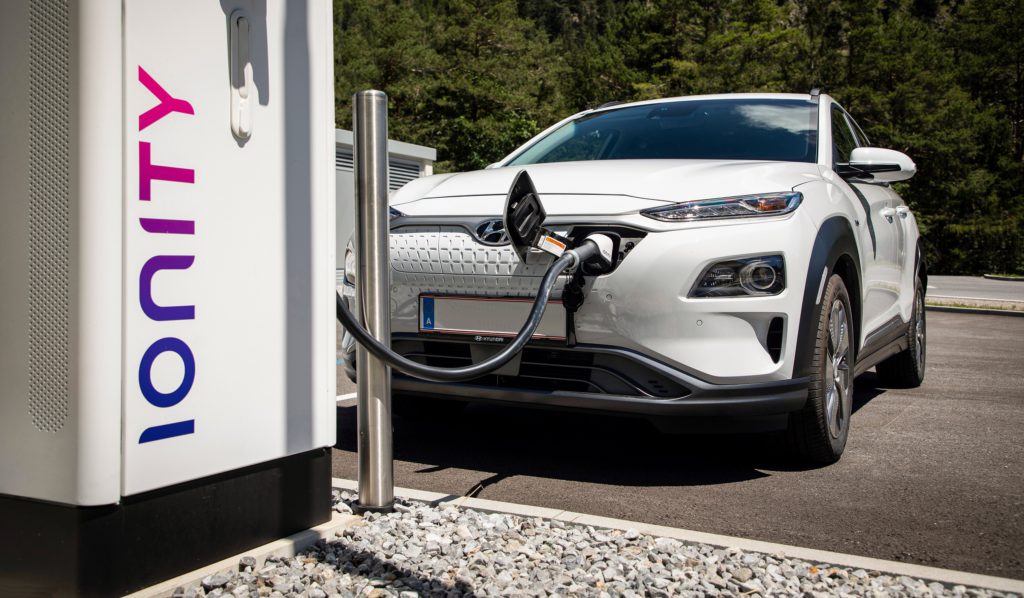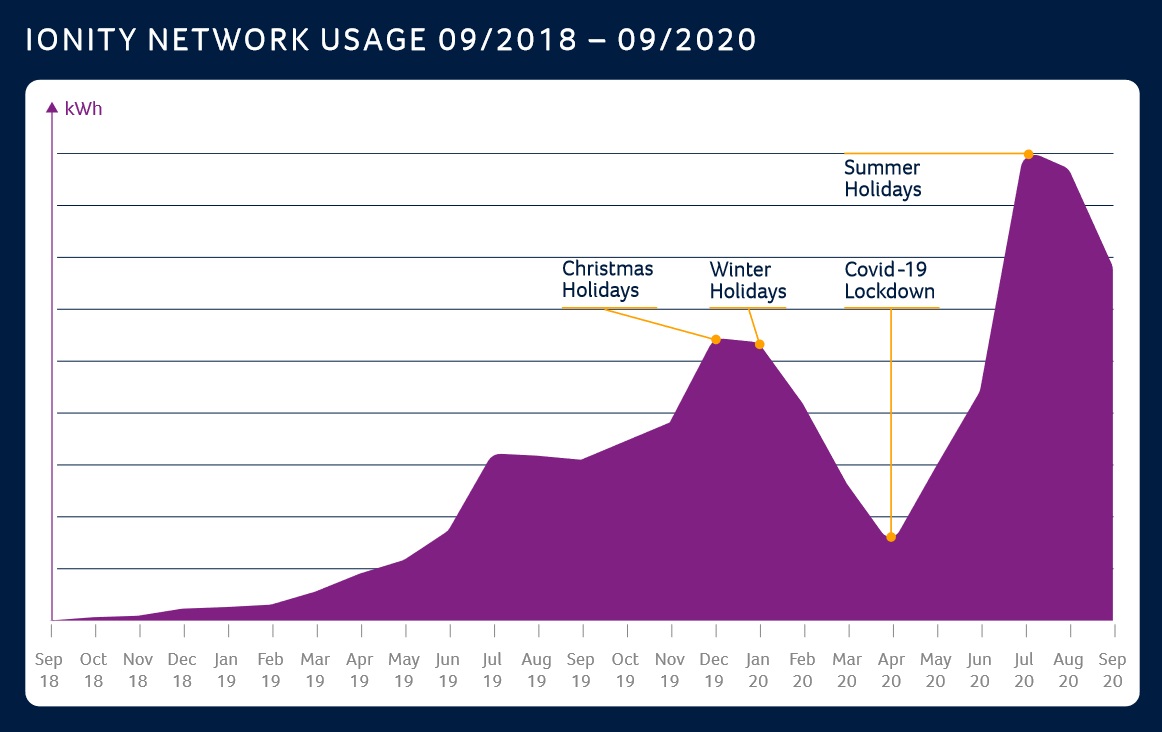Hyundai takes shares in Ionity as charge point usage increases
10 November 2020

10 November 2020
As it notices an increased uptake of electrically-chargeable vehicles (EVs) in Europe, infrastructure provider Ionity has joined forces with Hyundai Motor Group as a strategic partner and shareholder.
The Korean business, comprising of carmakers Hyundai and Kia, came through an extensive review by relevant regulatory bodies and will help drive the expansion of the Ionity network, as it looks to electrify highways across Europe.
In August, Hyundai said it would turn its Ioniq range into a fully-fledged sub-brand. It will concentrate on battery-electric vehicles (BEVs), and plans to introduce three new BEVs over the next four years, with more ′innovative’ models to follow.
The investment in Ionity, therefore, represents an opportunity for the carmaker to provide services beyond the sale of vehicles. Hyundai Motor Group joins BMW Group, Mercedes Benz AG, Ford Motor Company and Volkswagen Group (through Audi and Porsche) as a partner in the project.
Ionity represents the desire for carmakers to push their electrification strategies further and highlight to consumers the growth of infrastructure. A barrier to adoption of EV by consumers is a lack of charging points. The involvement with Ionity allows the brands to address this, while potentially offering drivers of their EVs deals and discounts when using the network.
′At Hyundai Motor Group, product and customer experience is closely related to convenience and real benefits. By investing in Ionity, we are now part of one of the most comprehensive charging infrastructure networks in Europe,’ says Thomas Schemera, head of product division at Hyundai Motor Group. ′Our support for our customers doesn’t end at the time of sale. We are committed to providing holistic solutions to make it easier than ever for people to make the switch to ecomobility.’
Increased usage
The charging network has released data showing a rapid increase in usage of its charging points following the COVID-19 lockdown period in Europe.
With governments pushing for a green recovery from the pandemic, EVs have been held in higher regard, as incentive schemes help to drive sales in many major European markets. In addition, an increased wariness of travelling on public transport is pushing people to reconsider their mobility needs. Both BEVs and plug-in hybrids (PHEVs) have seen registrations improve since countries started to emerge from lockdowns.
′Apparently, the pandemic has made people reflect on the way we all travel short and long-distance’, says Michael Hajesch, CEO at Ionity. ′This is not only from a consumer point of view. For example, in several European countries, the government just recently launched a series of measures to tackle the negative economic consequences of the pandemic, including a temporary increase in subsidies for electric and hybrid vehicles.’
 Source: Ionity
Since the end of lockdown, the charge point supplier has seen a spike in energy consumption across its network, backing the claims that more people are using their EVs for shorter distance driving and increased sales are helping. While usage tailed off in September, the implementation of further lockdowns in Europe, with more people being urged to work from home or only travel short-distances, could see another increase in usage.
Electric benefits
The figures highlight that electric mobility makes sense beyond the financial benefits linked to incentive schemes. For drivers and commuters across Europe, travel has changed since the pandemic hit the continent. Businesses are moving to online platforms, and meetings are taking place virtually.
Internal combustion engines (ICE) often see increased fuel consumption when shorter journeys are made. With average mileage likely to have dropped following COVID-19 lockdowns, the use of an EV makes even more sense. This may also be why PHEVs are performing better than BEVs at present, as drivers hedge their bets on the need to cover long distances against the convenience of electric-only power for shorter trips.
Source: Ionity
Since the end of lockdown, the charge point supplier has seen a spike in energy consumption across its network, backing the claims that more people are using their EVs for shorter distance driving and increased sales are helping. While usage tailed off in September, the implementation of further lockdowns in Europe, with more people being urged to work from home or only travel short-distances, could see another increase in usage.
Electric benefits
The figures highlight that electric mobility makes sense beyond the financial benefits linked to incentive schemes. For drivers and commuters across Europe, travel has changed since the pandemic hit the continent. Businesses are moving to online platforms, and meetings are taking place virtually.
Internal combustion engines (ICE) often see increased fuel consumption when shorter journeys are made. With average mileage likely to have dropped following COVID-19 lockdowns, the use of an EV makes even more sense. This may also be why PHEVs are performing better than BEVs at present, as drivers hedge their bets on the need to cover long distances against the convenience of electric-only power for shorter trips.
 Source: Ionity
Since the end of lockdown, the charge point supplier has seen a spike in energy consumption across its network, backing the claims that more people are using their EVs for shorter distance driving and increased sales are helping. While usage tailed off in September, the implementation of further lockdowns in Europe, with more people being urged to work from home or only travel short-distances, could see another increase in usage.
Electric benefits
The figures highlight that electric mobility makes sense beyond the financial benefits linked to incentive schemes. For drivers and commuters across Europe, travel has changed since the pandemic hit the continent. Businesses are moving to online platforms, and meetings are taking place virtually.
Internal combustion engines (ICE) often see increased fuel consumption when shorter journeys are made. With average mileage likely to have dropped following COVID-19 lockdowns, the use of an EV makes even more sense. This may also be why PHEVs are performing better than BEVs at present, as drivers hedge their bets on the need to cover long distances against the convenience of electric-only power for shorter trips.
Source: Ionity
Since the end of lockdown, the charge point supplier has seen a spike in energy consumption across its network, backing the claims that more people are using their EVs for shorter distance driving and increased sales are helping. While usage tailed off in September, the implementation of further lockdowns in Europe, with more people being urged to work from home or only travel short-distances, could see another increase in usage.
Electric benefits
The figures highlight that electric mobility makes sense beyond the financial benefits linked to incentive schemes. For drivers and commuters across Europe, travel has changed since the pandemic hit the continent. Businesses are moving to online platforms, and meetings are taking place virtually.
Internal combustion engines (ICE) often see increased fuel consumption when shorter journeys are made. With average mileage likely to have dropped following COVID-19 lockdowns, the use of an EV makes even more sense. This may also be why PHEVs are performing better than BEVs at present, as drivers hedge their bets on the need to cover long distances against the convenience of electric-only power for shorter trips.